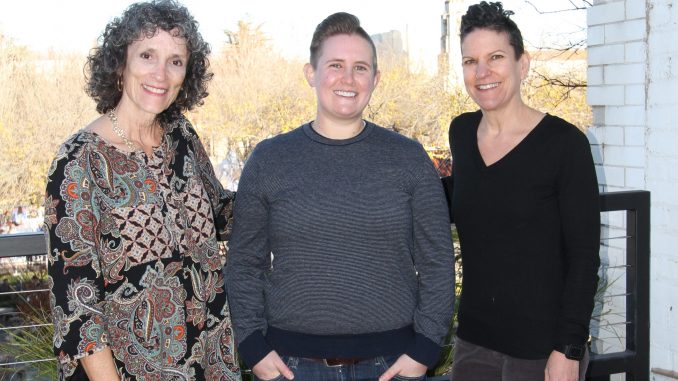
The pandemic may have altered a lot of traditions, but one we’ve maintained at the CN&R is our annual Whom to Watch feature, spotlighting locals we anticipate will make significant impacts—or at least headlines—over the coming year.
Women dominate our list this time. Their roles—county supervisor, city council member, deputy city manager, nonprofit agency executive director—put them in key positions heading into 2022. We also highlight a musician-turned-show booker in a similarly pivotal spot.
These are some of the people we’ll be watching.
Last liberals standing
Debra Lucero, Alex Brown and Tami Ritter
Last year brought a significant shift in local politics. Chicoans have grown accustomed to their two Butte County Supervisors (currently both liberals) holding minority positions on the five-member board, but after the 2020 general election, they saw control of the City Council flip to conservatives as well. In July, that majority fortified its position by appointing like-minded members to two vacated seats (one of which had been held by a progressive).
Alex Brown, Chico’s vice mayor in 2019-20, is now the lone liberal on the seven-member council. She and Supervisors Debra Lucero and Tami Ritter represent priorities of a significant constituency (nearly 44 percent of Chico’s registered voters are Democrats, compared to 27 percent Republicans and 21 percent “no party preference”) in the face of opposition that often appears intractable. They’re outnumbered—and, with each in the final year of her first term, their seats will be up for grabs in 2022.
Speaking together with the CN&R, Lucero and Ritter said they will run for re-election, while Brown’s plans are “to be determined.” All three remain equally passionate about championing issues and policies they see as important—from housing to social services to water—despite political dynamics.
“I kind of feel like that little kid out there on the ice who keeps falling down,” Lucero said, pointing to the City Plaza rink. “You almost get up, and then you slip and fall again. It’s hard to get your feet under you.”
“Yeah, but without the proper equipment, right?” Brown interjected. “You don’t have your safety equipment or your ice skates. The environment is set up in a way that disenfranchises your ability to do what you want to do or how you want to serve.”
“Because there’s not a give and take,” Lucero continued. “There’s not a reaching across the aisle. They’ll let you talk, but then it’s like, OK, we’re going to do what we want to do.”
At the county level, that divide focused most clearly on redistricting, where Lucero and Ritter vehemently dissented on the map approved by the other supervisors—prompting the two to get behind a referendum effort challenging the new district lines. Petitions were circulating as the CN&R went to press.
City-wise, homelessness has been the fulcrum, with Brown consistently objecting to decisions by the council majority, including those that precipitated the Warren v. City of Chico federal lawsuit.
“I think there’s a lot of different ways for us to ‘do the right thing’ and it doesn’t look exactly the same for everyone,” Ritter said. “But there should be a way for everyone to get their ideas out there—to their representative, to have a voice in it—and that is so out of balance right now.”
They haven’t felt they serve in vain. Ritter cited as an example increased funding allocations to behavioral health and social services over the past three years.
“I don’t have to be in the majority to help facilitate change,” she said.
“Because you have to get the vision out there,” Lucero added. “You have to get the hope out there.”
“I’ll just admit, being in the majority was difficult, too, in its own ways,” Brown said, alluding to her first two years on the council, when the balance was 5-2 in favor of liberals. “It’s difficult to get work done, and it requires a steady hand, and you learn as you go when you just start out in these roles. I think more and more, whether somebody disagrees with me or somebody is supportive of me, all of that blends to make a better public servant out of me.”
—Evan Tuchinsky

Beacon for the unhoused
Taylor Storey
Taylor Storey is intimately familiar with the type of catastrophic disaster that’s caused many North State residents to experience homelessness. A native of the Gridley area and an alumna of Chico State, Storey called Plumas County home for the last several years and was living in Greenville when the Dixie Fire leveled that community last August.
Though her home was not destroyed by the blaze, smoke damage, toxic water and a lack of access to the property necessitated an unanticipated move back to Chico, an experience which undoubtedly informs her perspective as she takes the reins as executive director of True North Housing Alliance this week (beginning Jan. 4). The position has been held by Joy Amaro since 2017.
Storey’s many responsibilities in that role will include overseeing the operations of Chico’s only year-round emergency homeless facility, the Torres Community Shelter, which is in the midst of a multiphase expansion and renovation. The shelter is just one initiative the nonprofit facilitates; True North also provides bridge housing via its Aurora North and Friends House programs (for families and men, respectively), as well as rapid rehousing, street outreach and support programs.
Storey sharpened her social work chops at Chico State, and she told the CN&R that she developed “a really extensive background in crisis work and working with people in the most need of services” as a therapist with Plumas County Behavioral Health (PCBH). In addition to this experience in the trenches, Storey said the main reason she clicked with True North’s board was her focus on program development and management.
“In time, I’ve become more focused on identifying social problems and their root causes, analyzing policies and looking for solutions,” she said.
Storey pointed to a successful program she developed, implemented and ran for her master’s thesis called the Transition Age Youth Peer Employment Program (“It’s a mouthful, I know,” she quipped) in the Quincy/Greenville area. The program was designed to provide vocational and life-skills training to youths with mental illness in foster care and on probation.
“When I was working with them clinically, as their therapist, I saw that many were falling through the cracks. They didn’t have support to help get into base-level programs,” she said. “There was really nothing for them.”
Storey said the program effectively taught real-world skills while providing “off-the-couch” therapy, enabling participants to work with groups and develop their socialization while learning. She partnered with local nonprofits to provide training, particularly organizations oriented around land and resource management, forestry and conservation because they represent the main industries in Plumas County. Realizing the bulk of her clients were young women as well as members of the LGBTQ+ community, she deliberately sought out partnerships with groups led by women. Specific jobs included working on a sustainable farm and establishing a community garden with PCBH.
Storey said her most pressing goal is establishing a strong, diverse administration team and developing partnerships with other service providers to tackle True North’s internal objectives and larger external homeless issues via a holistic, mutual-aid approach. She also believes she’s prepared for the type of scrutiny and ire aimed at local service providers when it comes to homeless issues in Chico.
“I have a really great support system,” she said. “I always try to take care and ask for help when needed, try to recognize what’s within my control and what’s not, and keep focused on actual goals and the mission instead of personal attacks.
“But, being human, I know it won’t always be easy.”
—Ken Smith
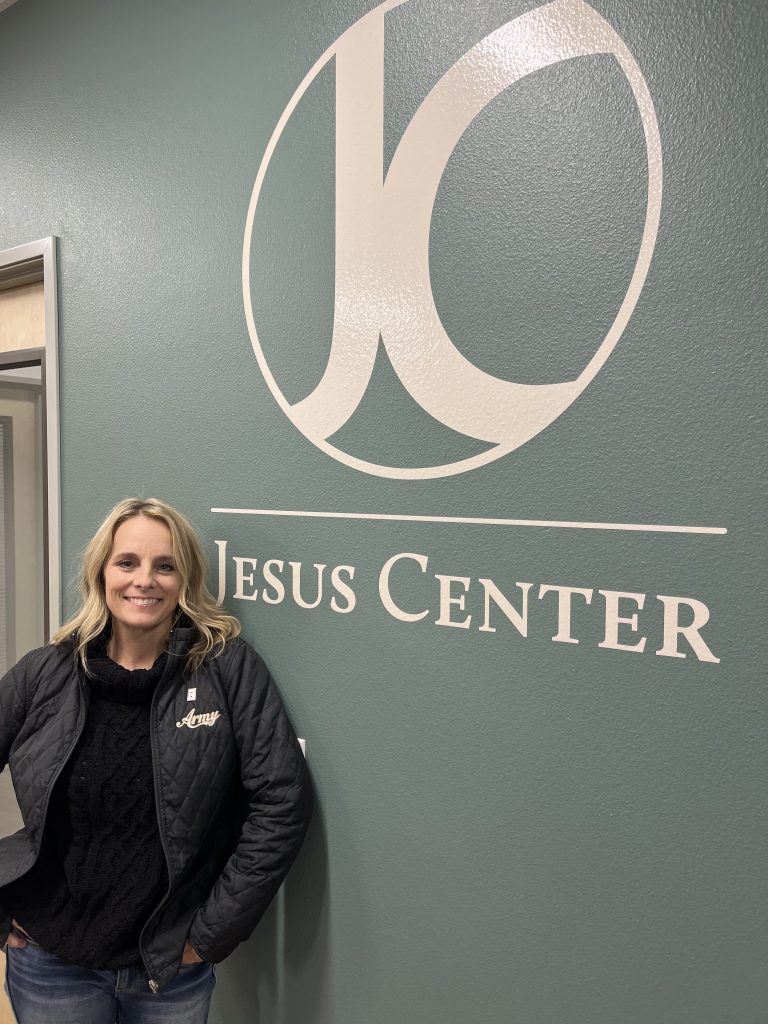
New center, new director
Amber Abney-Bass
A lot has changed since Amber Abney-Bass first joined the Jesus Center staff, as its development director, in 2014. For starters, the center itself was located on Park Avenue and was best known as a place for unhoused people to fill immediate needs—a meal, a shower, a mailbox and essentials like shoes, clothing and warm gear available at its free store.
Last spring, the center moved a few blocks away, to Fair Street. At this new and still-developing campus, the focus has shifted to providing greater shelter capacity, a broader range of programming and easier connection to county agencies. Further improvements—including more shelter beds and mental- and physical health care facilities—are still in the works.
The latest change is the center’s executive director. Laura Cootsona has left that role, which she’s filled since October 2015, and Abney-Bass officially took the title Jan. 1. Abney-Bass explained that the transition has been in the works for at least 15 months and that she’s been running the center’s day-to-day operations since she was named its chief operations director last January.
While discussing the center’s development and her involvement with it over the past seven years, Abney-Bass spoke about how changes have been driven by several factors, the most fundamental of which is with the issue of homelessness itself.
“I’ll be honest, when I started here, it seemed to me that the complexity of people experiencing homelessness was a lot simpler, if you will,” she said. “It just didn’t seem nearly as complicated, and therefore the responses were different.
“For one thing, the numbers of people experiencing homelessness now is significantly higher than back then, and as that population has grown, so has the complexity, and we weren’t seeing the same results as we used to.”
One of the increased complexities Abney-Bass pointed to is the incidence and severity of substance abuse and mental illness.
“When I first started at the center, there’s no question that drug use was occurring, but I think now it’s much more prevalent than it was before, and it’s the same with mental illness. A lot of us [service providers] are constantly trying to figure out if one drives the other. There are studies that answer that in a variety of ways, but at the end of the day, we see the connection, and we see how these issues serve as an anchor to weigh people down.”
Increased need has prompted the Christian faith-based Jesus Center to embrace newer concepts like trauma-informed care and harm-reduction models to “make that anchor smaller so people can imagine a life when the anchor is gone,” Abney-Bass said.
“We’ve always been good at looking at what we do, being honest about what’s working and what’s not, and adjusting accordingly,” she added. “That’s how we’ll continue to do things and what shapes us.”
Abney-Bass said she treasures the time she’s spent working at the Jesus Center and looks forward to the future.
“It can be hard sometimes, but it’s always worth it,” she said. “There’s no shortage of heartbreak here … but there’s also no shortage of miracles.”
—Ken Smith
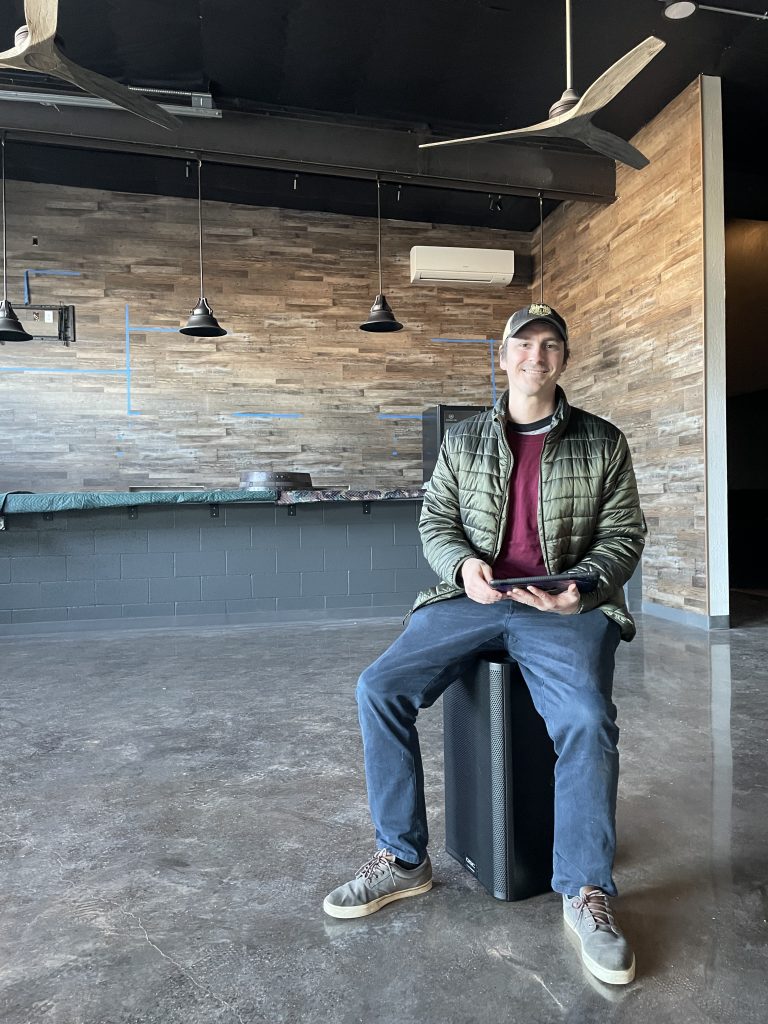
Expanding the music scene
Cameron Ford
Cameron Ford remembers booking his first live show at Secret Trail Brewing Co. The concert was to happen Sept. 5, 2020, the first performance after six months of none since the pandemic was declared. He had to really sell it to local singer/songwriter Pat Hull.
“I laid it all out for him: ‘You’re going to be behind a [plexiglass] drum shield. You’ll be playing inside the taproom; everyone else will be able to hear you from outside the taproom. They’ll be outside because we have no seating inside.’”
To start any job during the summer of 2020 was rough, but with the on-again/off-again nature of fluctuating mandates and the various COVID protocols—capacity restrictions, social distancing and those plexiglass barriers—one involving concert production was nearly impossible.
“It got really weird,” Ford admitted during a recent interview at the brewery’s pub. “Every day, I had to set up that shield. I’m so glad I don’t have to do that anymore.”
Despite the challenges, while many other venues have stalled or completely shut down, Secret Trail’s live programming has actually flourished during the pandemic.
Thanks to the brewery’s investment in a greatly expanded seating area, Ford was able to shift all shows to the outdoors. Wednesday night open mics and Sunday afternoon concerts featuring area artists have been very well received by locals starved for entertainment.
A couple months ago, Ford’s position as marketing/events manager—which includes website management, social media, booking, vetting musicians, stage management and sound engineering—was expanded to full time, and sometime in the new year (possibly early spring—depending, in part, how the pandemic plays out) he’ll be overseeing shows in Secret Trail’s newly expanded brewpub.
The capacity of the space is 50 people, which means it won’t be economically viable to host too many touring acts, but Ford sees it as an opportunity for local and regional artists to play in a professional environment and maybe up their game in response.
“There’s not a lot of places to play for musicians where the lights go down, the lights are on you, and no one is talking,” he said.
“I think somebody like a Pat Hull is going to be so well-received in that environment because he’s somebody who puts a lot of thought into his content, and [this will be] the type of place that rewards that kind of effort … or at least that’s what I envision,” Ford said. “It [also] gives somebody new—like, anybody from Apollo School of Music—the ability to play a show where they have the potential to be received like that.”
For his part, the longtime Chico musician with far-ranging experience in the field—from studying music in England to playing piano on a cruise ship with an improv group from Chicago’s Second City troupe—is enthusiastic about the experience at Secret Trail.
“I’ve never had a job that was so existentially fulfilling as this before,” Ford said. He also relishes the opportunity he has to try out different artists and approaches without having to jump through a bunch of bureaucratic hoops.
“The economic engine is not the music, it’s the beer. So, I have the ability to take more risks,” he said. “If I have an idea, I pitch it to [owners] Charlie and Michelle [Barrett], and they tell me to do it. That level of freedom—I’ve never had a job like that before. They are enthusiastic, they are extremely forgiving.
“Now I want to work here for the rest of my life.”
—Jason Cassidy
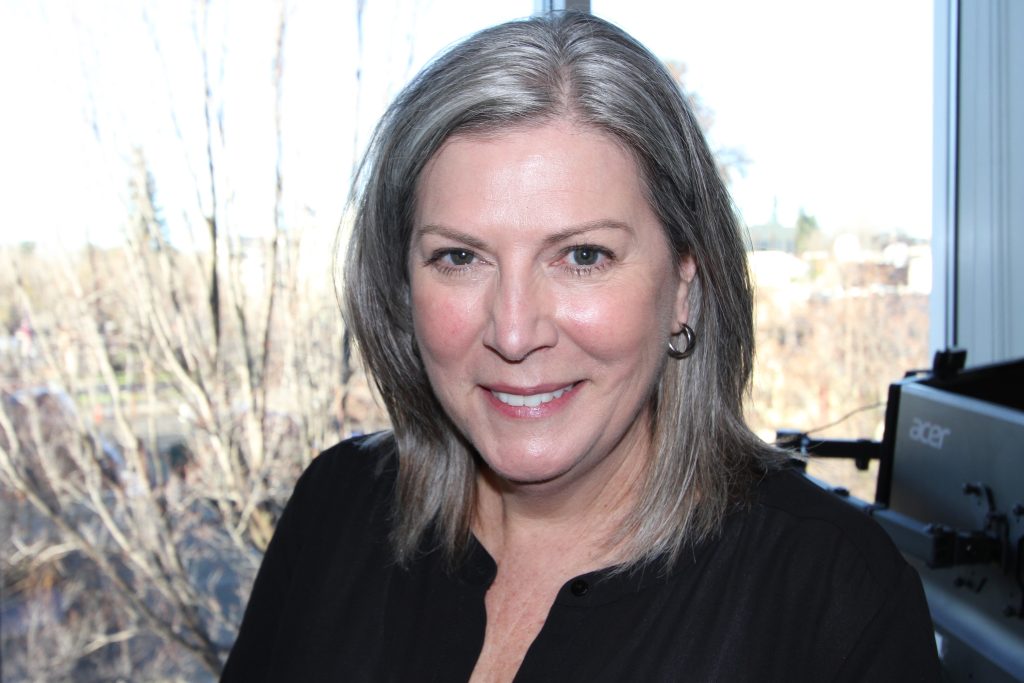
Eye on revitalization
Jennifer Macarthy
Jennifer Macarthy became Chico’s deputy city manager last spring, but to colleagues in the municipal center, it seems like she’s been on the job a lot longer. Her roots run deep, locally and in local government—and in less than a year, she’s made impacts that will ripple deep into 2022.
Born and raised in Chico, where she lives and raised her two adult children, Macarthy worked as a management analyst for community and economic development under former City Manager Tom Lando. That kicked off two decades in agencies around Butte County. Current City Manager Mark Orme met her while she was the county’s deputy administrative officer for community and economic development; he lured her back to the city when the job for his deputy opened up.
“It was wonderful to see such a dedicated public servant working on the county’s behalf, and that always stuck in my mind,” Orme said. “You always look around for people that have the ability to a) communicate and b) get the job done…. When I had a position to fill, I thought, ‘This is the person I’m going to reach out to,’ and I’m glad she considered it.”
Though Macarthy’s focus with the city is, once again, economic development, that’s not the extent of her role. She serves as acting city manager when Orme is away. She coordinates initiatives, such as streamlining permit processes for construction. She works on broad issues such as homelessness and infrastructure.
“Here I have a little more direct working relationship with our local community than I did with my previous position,” Macarthy said. “It is a smaller organization, so certainly the breadth of opportunity and the types of work I’m able to take on is more varied.”
Since coming onboard in April, she continued, “I’ve been spending a lot of my time in the planning phases [of projects], and I see that 2022 is going to be the year of implementation—and that’s exciting.”
Among her plantings set to bear fruit is the plan for $21.1 million in federal funding allocated to the city for COVID-related recovery through the American Rescue Plan. This includes assistance for small businesses and youth programs; commercial building improvements; permanent parklets for downtown eateries; and, in conjunction with the county, a pallet shelter at the BMX facility by the Silver Dollar Fairgrounds.
Macarthy also pulled off the back burner plans to redevelop Lost Park, a creekside area along East First Street, which the city and Chico State jointly envision transforming into a “gateway” to downtown and the university. She said they’ll select a development team this year “to move that project forward.” She’ll continue interfacing with the local economic development group Team Chico on business retention, business expansion and jobs.
“We look forward in 2022 to making sure that we are continually working toward an environment that enables investment to happen on a smooth basis and with assistance that the development community and businesses need to be successful,” she said.
Orme looks to Macarthy for more: “Even though her areas of focus now are on the local business community, her ability to adapt to what’s needed at the time I’ve already bore witness to, and she’s not even been here that long.”
—Evan Tuchinsky

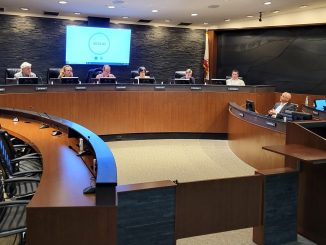


What a year for transitions in the homeless service community! The only thing missing from the article is that Chico Housing Action Team ALSO has just hired a new executive director! Her name is Nicole Drummond! All indications are that these three new E.D.s will bring lots of new energy and ideas to this worthy effort of ending or greatly reducing homelessness in our community.